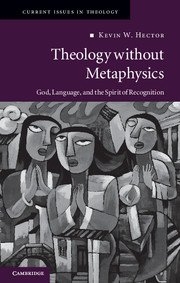6 - Emancipating theology
Published online by Cambridge University Press: 05 June 2012
Summary
I have been arguing that theology needs to be freed from metaphysical assumptions about God and language, and the preceding chapters have aimed to secure this freedom by elaborating an alternative account of each. One of my central claims, simply stated, was that so long as one remains bound to essentialist-correspondentist presuppositions about language and its relation to God, it will seem as if one has to choose between fitting God into a metaphysical framework, on the one hand, and insisting that God stands at a remove from creaturely language and experience, on the other. To be freed from these presuppositions, then, and so from the sense of alienation they beget, I defended a non-metaphysical understanding of both ordinary and theological discourse: by explaining semantical notions such as concept use, meaning, reference, and truth in terms of the norms implicit in the practice of recognition, explaining the mediation of Christ’s normative Spirit in terms of these same recognitive practices, and using the latter to explain the semantics of God-talk, I concluded that there need be no distance between God and language. The preceding account thus aimed to emancipate theology from its captivity to certain metaphysical assumptions. The aim of this final chapter is to make explicit the extent to which theology, thus emancipated, is itself emancipating, in that (a) it funds a robust notion of “expressive freedom,” and (b) it provides critical and constructive resources for movements of liberation.
Expressive freedom
We begin, accordingly, by making explicit the preceding proposal’s commitment to (and underwriting of) “expressive freedom.” Such freedom can be understood as a species of autonomy – understood, that is, in terms of one’s ability to see one’s doxastic and practical commitments (or “beliefs and actions,” for short) as due to one – where this being-due-to-one can itself be understood in terms of one’s standing in a certain relationship to one’s peers. On the picture that emerges, freedom turns out to depend upon one’s being constrained by communal norms which are themselves recognizable as due to one, and norms count as such just insofar as they are carried on by capacious patterns of mutual recognition.
- Type
- Chapter
- Information
- Theology without MetaphysicsGod, Language, and the Spirit of Recognition, pp. 245 - 293Publisher: Cambridge University PressPrint publication year: 2011



